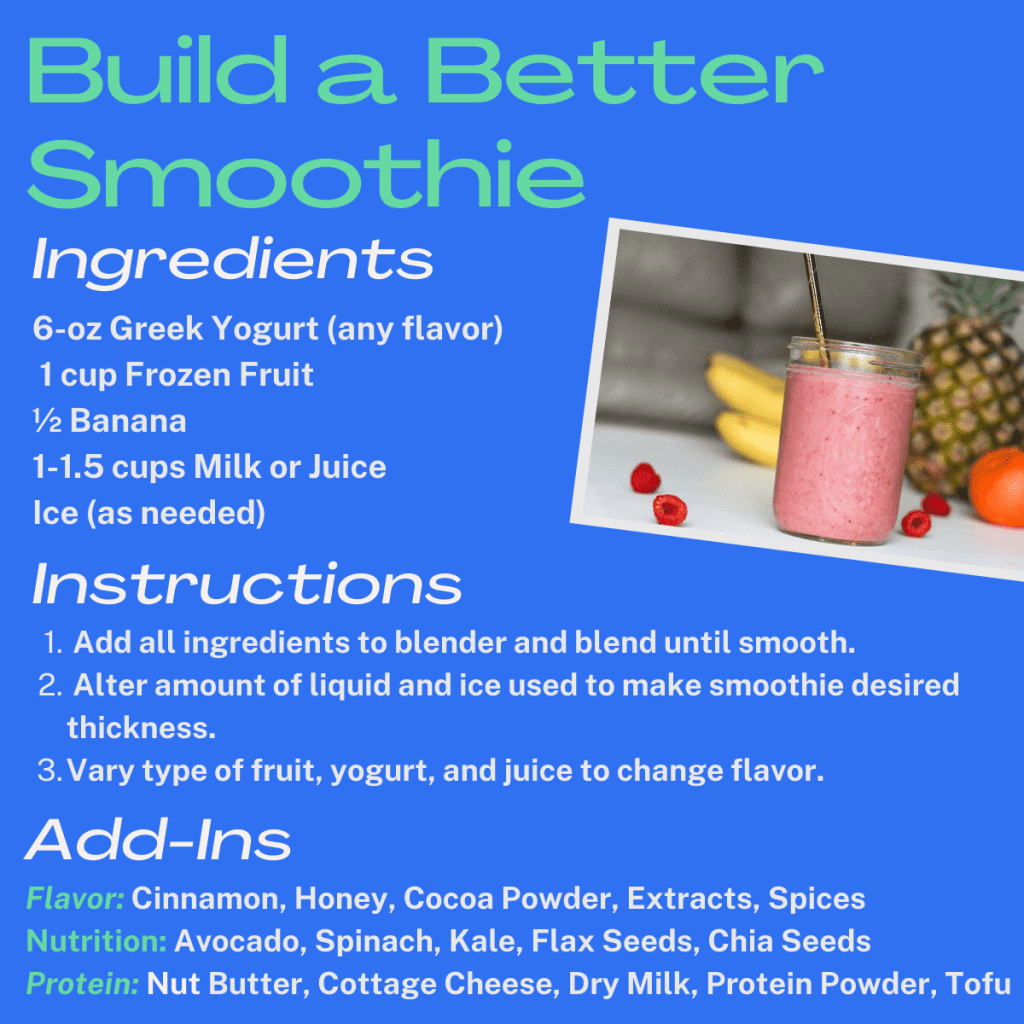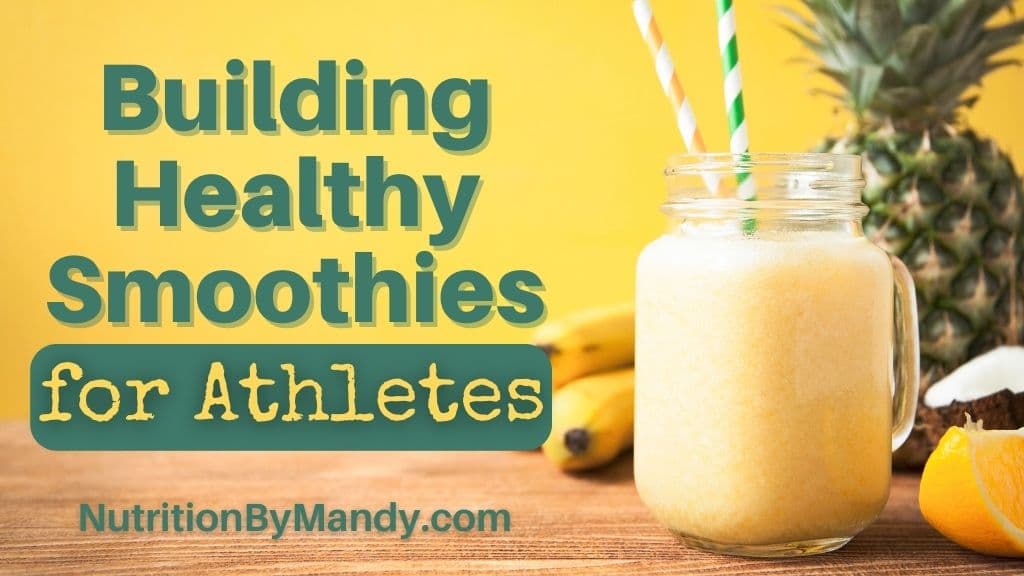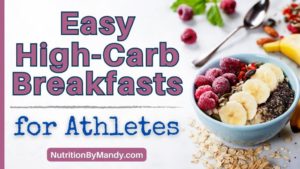Building Healthy Smoothies for Athletes
Whether looking for a quick breakfast on-the-go, a post-workout shake, or a high-protein drink before bed, smoothies can be a great option to help athletes meet their nutrition needs.
Fruit smoothies can be an economical way to add important nutrients to an athlete’s performance diet, including protein, carbohydrates, omega-3 fatty acids, vitamins, and minerals. One of the great aspects of smoothies is that athletes can continually change the ingredients for new flavor combinations.
Tips for Building Healthy Smoothies for Athletes
Check-out the ideas below for building healthy smoothies for athletes to help them meet their sports nutrition needs.
Adding Carbohydrates to Smoothies for Athletes
Carbohydrates provide athletes with the energy needed to perform at its best. Similar to gas for a car, carbohydrates provide fuel for the body to run on.
The carbohydrate needs of athletes vary based upon the intensity and duration of their workouts or competitions. Athletes need more carbohydrates (gas in their tank) on days they will be exercising more intensely or for a longer duration than on low-intensity workout days or off-days (1).
Smoothies can be a great way to help athletes meet their daily carbohydrate needs. Consider the following ideas for adding carbohydrates to a smoothie:
- Frozen fruit: Berries, cherries, mango, pineapple, peaches, papaya, sliced banana
- 100% fruit juice
- Milk
- Yogurt
- Rolled oats
- Honey, maple syrup

Adding Protein to Smoothies for Athletes
One of the benefits of fruit smoothies is that they are an easy way to support athletes with meeting their protein needs. To get the most benefit from protein intake, athletes are encouraged to spread their protein intake throughout the day (2). In general, athletes should consume ~0.25 grams of protein/kg of body weight at each eating occasion (~25 – 30 grams).
Athletes desiring to gain or maintain muscle mass should aim to consume an evening snack that provides a good source of protein. Including protein in a snack before going to sleep provides the muscles with the building blocks needed to promote recovery during the night (3).
Ideas for Adding Protein to Smoothies
Athletes can easily add protein to their smoothies utilizing some of the ingredients listed below.
Greek Yogurt
Greek Yogurt is a quick and easy way to add protein to a smoothie. A 5.3 oz individual container of Greek yogurt contains ~13 grams of protein (4). Athletes can change the flavor of the Greek yogurt used in the smoothie to alter the smoothie’s taste.
Cottage Cheese
Cottage cheese is an excellent source of protein, containing ~28 grams per cup (5). The main type of protein in cottage cheese is casein protein. Casein is a slow acting protein, which makes it an ideal protein to consume before bed (2).
Consider adding cottage cheese to an evening smoothie to take advantage of its high casein content. Blending cottage cheese into a smoothie is a great option for athletes who do not like it’s texture. When cottage cheese is blended into a smoothie it will make the smoothie creamy, otherwise athletes won’t even know it’s there.
High-Protein Milk
Ultra-filtered, high-protein milks are a great way to increase the protein content of an athlete’s smoothie. Ultra-filtered milks, such as Fairlife® or H-E-B MooTopia, are high-protein milk options athletes can try. These milks are filtered to remove the lactose and concentrate both the protein and calcium content of the beverage.
To provide a comparison, a cup of ultra-filtered milk has ~13 grams of protein, while a cup of regular cow’s milk has 8 grams of protein. As an added bonus the ultra-filtered milk is lactose free making it a great option for those who are sensitive to lactose.
Dry Milk
Adding non-fat, dry (powdered) milk is another easy way to boost the protein content of an athlete’s smoothie. Adding 0.25 cup of dry milk to the smoothie will increases the protein content by 11 grams (6).
Silken Tofu
Athletes wanting a plant-based option for increasing the protein content of their smoothie can use silken tofu. Adding 3-oz of silken tofu to a smoothie provides ~ 6 grams (depending on the brand) of soy protein (7).
Protein Powder
Many athletes use protein powder as a convenient way to boost the protein content of their smoothies. Protein powders typically provide ~20-25 grams of protein per scoop depending on the brand.
If an athlete is considering the use of protein powder as an ingredient in the smoothie, it is important to select a high-quality product. Sports supplements are not regulated by the Food and Drug Administration in the same way that food is. Dietary supplements may contain banned substances that could potentially be harmful to the athlete’s health or make the athlete ineligible for competition.
Due to this, athletes should look for supplements that have been third-party tested. Supplements that are third-party tested have an outside organization evaluate the supplement for accuracy of ingredients. Two companies that evaluate sports supplements are NSF International Certified for Sport and Informed Sport.

Boost the Nutrient Content of Smoothies for Athletes
In addition to carbohydrates and protein, smoothies can be a great way for athletes to increase their intake of vitamins, minerals, and other nutrients.
Adding Vitamins, Minerals, and Antioxidants to Smoothies for Athletes
Frozen Fruit
Frozen fruit is a great way to ensure an athlete’s smoothie is packed full of nutrition. When fruit is frozen fruit, it is flash-frozen at the peak of ripeness. Thus, frozen fruit maintains a nutrient content similar to fresh fruit. Some of my favorite frozen fruits for smoothies include: mixed berries, cherries, mango, pineapple, and peaches.
Bananas are a great way to make smoothies creamy and delicious. Consider slicing fresh bananas and freezing the slices to throw into your smoothie.
Make sure to slice the banana before freezing it. Trying to blend a whole, frozen banana is likely to break the blender…trust me on this one!
Leafy Greens
Another easy way to boost the nutrient content of your smoothie is by adding in leafy greens, such as kale or spinach. Although this will turn the smoothie a greenish-brown color, it will not alter the smoothie’s flavor and will add vitamins, minerals, and antioxidants to the drink.
Spices in Smoothies
The use of spices is an easy way to enhance the flavor and nutritional content of a smoothie. Many spices provide antioxidant and anti-inflammatory benefits, which can be beneficial for athletes.
Consider the following spices to add to a smoothie:
- Turmeric
- Cinnamon
- Nutmeg
- Ginger
- Cardamon
- Cloves
Adding Omega-3 Fatty Acids to Smoothies for Athletes
Chia seeds and ground flaxseeds are both nutrient-dense seeds that can be added to smoothies. The seeds both contain alpha-linolenic acid, which is a type of omega-3 fatty acid.
Omega-3 fatty acids have many roles in the body, such as supporting optimal brain health, cardiovascular function, and working to help reduce inflammation. In addition to alpha-linoleic acid, flaxseeds and chia seeds contain protein, fiber, vitamins, and minerals, making them healthy additions to your smoothie.

Tips for Making a High-Calorie, Healthy Smoothie for Athletes
Athletes looking to gain weight, can make a high-calorie smoothie packed full of nutrition to help increase their daily caloric intake.
Consider adding the following ingredients to a smoothie for added nutrients, calories, and healthy fats.
Nut Butters
A simple way to add nutritious calories and flavor to an athlete’s smoothie is with nut butter. Adding 2 Tbsp of nut butter to the smoothie will increase the caloric content by ~200 calories and add 7 grams of protein (8).
If an athlete has a nut allergy, SunButter® is an allergen-free option (made with sunflower seeds) the athlete can try. A 2 Tbsp serving of the Organic SunButter® Sunflower Butter provides 220 calories and 8 grams of protein.
Avocados
Athletes can easily boost the caloric and nutrient content of a smoothie by blending in avocado. Avocados are incredibly nutrient dense. One medium avocado (201 g) contains 322 calories, 30 grams of fat, and 14 grams of fiber (9).
The majority of fat found in avocados is monounsaturated fat, a type of healthy, unsaturated fat. Avocados have a mild flavor; thus, it will not alter the taste of your smoothie. However, avocados will help give the smoothie a creamy texture.
Healthy Fruit Smoothie Recipe for Athletes
Below is the recipe to prepare a basic fruit smoothie for athletes. Athletes can experiment with changing up the type of frozen fruit, spices, and other ingredients used in the smoothie to make a variety of flavor combinations.

Building Healthy Smoothies for Athletes
You now have ideas for ingredients to include when preparing healthy smoothies for athletes. For additional suggestions on ways to meet your performance nutrition needs visit with a sports dietitian nutritionist. The sports dietitian nutritionist can work with you on developing a customized meal plan to support your performance goals.
If you are interested in additional sports nutrition recipes, check out my blog on how to make protein overnight oats.
Get a Free PDF Copy of this Article When You Join the Nutrition By Mandy E-Mail List
Click HERE to join the Nutrition By Mandy e-mail list. When you join you will receive a free PDF copy of the Building Healthy Smoothies for Athletes blog.
About the Author
Mandy is a Sports Dietitian Nutritionist in the San Antonio, TX area. She is a Registered and Licensed Dietitian, a Board-Certified Specialist in Sports Dietetics, a Licensed Athletic Trainer, and is a Certified Exercise Physiologist through the American College of Sports Medicine. Mandy has experience working with athletes at the high school, collegiate, and professional levels. She believes the key to reaching one’s full potential, both in everyday life and in sports performance, relies on a healthy nutritional foundation. Learn more about the work Mandy does here.






